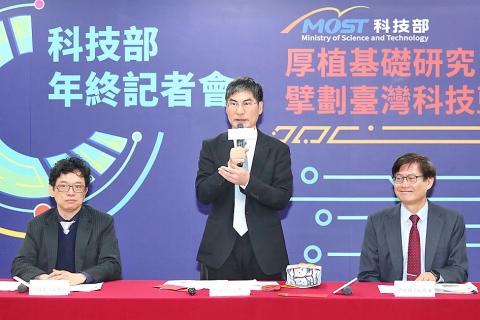Minister of Science and Technology Chen Liang-gee (陳良基) used an annual lunar-year-end news conference in Taipei to outline the government’s plans to boost the nation’s technological competitiveness, including a new subsidy program for outstanding doctoral students in key technology fields.
The Ministry of Science and Technology’s budget this year is NT$38.8 billion (US$1.26 billion), up from last year’s NT$36.5 billion — which had been an eight-year low, and it would continue striving to boost its budget for basic research, Chen said.
To draw up a road map for the nation’s technological development, the ministry has advised the Executive Yuan to move up the 11th national science and technology conference to this year, instead of next year, and it would host several preparatory meetings to collect opinions prior to the conference, he said.

Photo: CNA
Taiwan has a shortage of people in fields related to biotechnology and digital transition, including gene sequencing, manufacturing, artificial intelligence and the Internet of Things, and quantum computing, he said.
The number of students in doctoral programs related to information and communication technologies has declined by 45 percent over the past decade, Chen said.
Executive Yuan data showed that in 2017, almost 736,000 Taiwanese moved abroad for work, with 55 percent going to China, 13.7 percent to the US and 14.8 percent to Southeast Asian countries.
To encourage Taiwanese to pursue higher degrees, the ministry plans to offer monthly subsidies of NT$30,000 to NT$50,000 to 600 outstanding doctoral students every year, so they will not have to worry about earning money, he said.
Hopefully, the subsidy program will be in place before September, but his ministry needs further talks with the Ministry of Education about dividing the expenditure, he said.
Local companies should boost salary levels and improve working conditions and career advancement to help curb the brain drain, as well as providing schools with more resources to cultivate talented individuals, Chen said.
Many other nations, including Israel, France and the UK, have expressed an interest in recruiting Taiwanese high-tech talent, so students should be willing to move outside their comfort zones and apply for overseas training projects, he said.
The science ministry’s plan to send Taiwanese to intern at Uber’s San Francisco headquarters would start as soon as there are enough qualified applicants, he said.
Taiwanese often impress foreign tech firms with their solid academic training, but they should strengthen their oral presentation skills to gain an edge, he added.

A magnitude 7.0 earthquake struck off Yilan at 11:05pm yesterday, the Central Weather Administration (CWA) said. The epicenter was located at sea, about 32.3km east of Yilan County Hall, at a depth of 72.8km, CWA data showed There were no immediate reports of damage. The intensity of the quake, which gauges the actual effect of a seismic event, measured 4 in Yilan County area on Taiwan’s seven-tier intensity scale, the data showed. It measured 4 in other parts of eastern, northern and central Taiwan as well as Tainan, and 3 in Kaohsiung and Pingtung County, and 2 in Lienchiang and Penghu counties and 1

A car bomb killed a senior Russian general in southern Moscow yesterday morning, the latest high-profile army figure to be blown up in a blast that came just hours after Russian and Ukrainian delegates held separate talks in Miami on a plan to end the war. Kyiv has not commented on the incident, but Russian investigators said they were probing whether the blast was “linked” to “Ukrainian special forces.” The attack was similar to other assassinations of generals and pro-war figures that have either been claimed, or are widely believed to have been orchestrated, by Ukraine. Russian Lieutenant General Fanil Sarvarov, 56, head

FOREIGN INTERFERENCE: Beijing would likely intensify public opinion warfare in next year’s local elections to prevent Lai from getting re-elected, the ‘Yomiuri Shimbun’ said Internal documents from a Chinese artificial intelligence (AI) company indicated that China has been using the technology to intervene in foreign elections, including propaganda targeting Taiwan’s local elections next year and presidential elections in 2028, a Japanese newspaper reported yesterday. The Institute of National Security of Vanderbilt University obtained nearly 400 pages of documents from GoLaxy, a company with ties to the Chinese government, and found evidence that it had apparently deployed sophisticated, AI-driven propaganda campaigns in Hong Kong and Taiwan to shape public opinion, the Yomiuri Shimbun reported. GoLaxy provides insights, situation analysis and public opinion-shaping technology by conducting network surveillance

‘POLITICAL GAME’: DPP lawmakers said the motion would not meet the legislative threshold needed, and accused the KMT and the TPP of trivializing the Constitution The Legislative Yuan yesterday approved a motion to initiate impeachment proceedings against President William Lai (賴清德), saying he had undermined Taiwan’s constitutional order and democracy. The motion was approved 61-50 by lawmakers from the main opposition Chinese Nationalist Party (KMT) and the smaller Taiwan People’s Party (TPP), who together hold a legislative majority. Under the motion, a roll call vote for impeachment would be held on May 19 next year, after various hearings are held and Lai is given the chance to defend himself. The move came after Lai on Monday last week did not promulgate an amendment passed by the legislature that